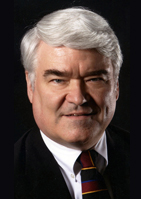© 2013 The Texas Lawbook.
By Mark Curriden, JD
Senior Writer for The Texas Lawbook
(September 10) – Supreme Court of Texas Senior Justice Nathan Hecht will be moving his office 50 feet down the hall in three weeks as he takes over as the state’s next chief justice.
Gov. Rick Perry announced Tuesday that Hecht, who has served on the state’s highest court for 25 years, authored more than 350 opinions and is scheduled to become the longest serving justice in Texas history in 2014, will replace Chief Justice Wallace Jefferson, who announced last week that he is resigning effective Oct. 1.
“I love this court and I’m looking forward to working hard everyday to improve the public administration of justice,” Hecht said in an interview with The Texas Lawbook Tuesday. “There’s a lot of work to do and I mainly plan to continue the great efforts started by Chief Justice [Tom] Phillips and Chief Justice Jefferson.”

Gov. Perry, in a written statement, described Hecht as “a man of the most upstanding character and integrity, with an uncompromising commitment to protecting the interests of the citizens of Texas.” The governor is expected to name a new justice to fill Hecht’s spot in the next few days.
Hecht’s promotion to chief justice is highly unlikely to impact how the state’s highest court decides cases. He is viewed as the leader of a solid majority of justices that have strong conservative and pro-business leanings, according to legal analysts.
The appointment of Hecht also represents an effort at continuity on the administrative side, as Hecht and Jefferson were aligned in issues ranging from improved transparency and electronic filing to increased funding for legal aid for the poor and middle class.
“I plan to keep a strong hand in pushing for improvements in access to justice,” Hecht said. “Access to justice and legal aid is not a Republican issue and it isn’t a Democratic issue. It is about ensuring basic fairness and access to everyone.”
A 1974 graduate of the SMU Dedman School of Law, Hecht is a former lieutenant in the U.S. Naval Reserve Judge Advocate General Corps. He was a young lawyer at the Dallas-based law firm now known as Locke Lord.
Hecht was appointed to the Dallas County District Court in 1981. Five years later he was appointed to the state Court of Appeals. He ran for the Texas Supreme Court in 1988 and won.
Justice Don Willett said Hecht being named chief justice is “a well-deserved capstone to a peerless judicial career.”
“When I joined the Court in 2005, Nathan had more tenure than the other eight of us combined,” Willett said. “He’s the psuche of the Supreme Court – unrivaled intellect, cracker-jack writing, mastery of all things rule and administration-related, and a steadfast commitment to ensuring court access for low-income Texans.”

Hecht has been the long-time leader of the Supreme Court’s Rules Committee – a position he says he plans to maintain – and he successfully pushed the Texas Legislature to increase jury pay from $6 a day to $40 in 2003.
“The civil justice system is just too expensive,” he said. “We have to look at the whole structure of the justice delivery system in our state. Most people simply cannot afford to access our justice system.”
Hecht said that the state needs to look at further limiting or tailoring discovery in civil disputes, especially in the area of electronic discovery, which is so expensive. But he said that he wants to work with the law schools in Texas to possibly modify their curriculum to be more practice-focused.
Of course, Justice Hecht has his critics. Most trial lawyers contend that he is anti-jury, anti-plaintiff and too pro-business in his decision-making.
Family lawyers dislike Hecht because he pushed to make court-approved forms available to those filing for divorce – forms that divorce lawyers and even many trial court judges believe are legally flawed and will have a negative impact on the finances of family legal practices across the state.
Hecht will complete the rest of Chief Justice Jefferson’s term, which expires at the end of 2014. He said he plans to run for re-election as chief justice next year. As chief justice, Hecht will earn $170,500 a year, which is $2,500 than he currently earns. His office will be larger, but he has to give up his balcony.
© 2013 The Texas Lawbook. Content of The Texas Lawbook is controlled and protected by specific licensing agreements with our subscribers and under federal copyright laws. Any distribution of this content without the consent of The Texas Lawbook is prohibited.
If you see any inaccuracy in any article in The Texas Lawbook, please contact us. Our goal is content that is 100% true and accurate. Thank you.
